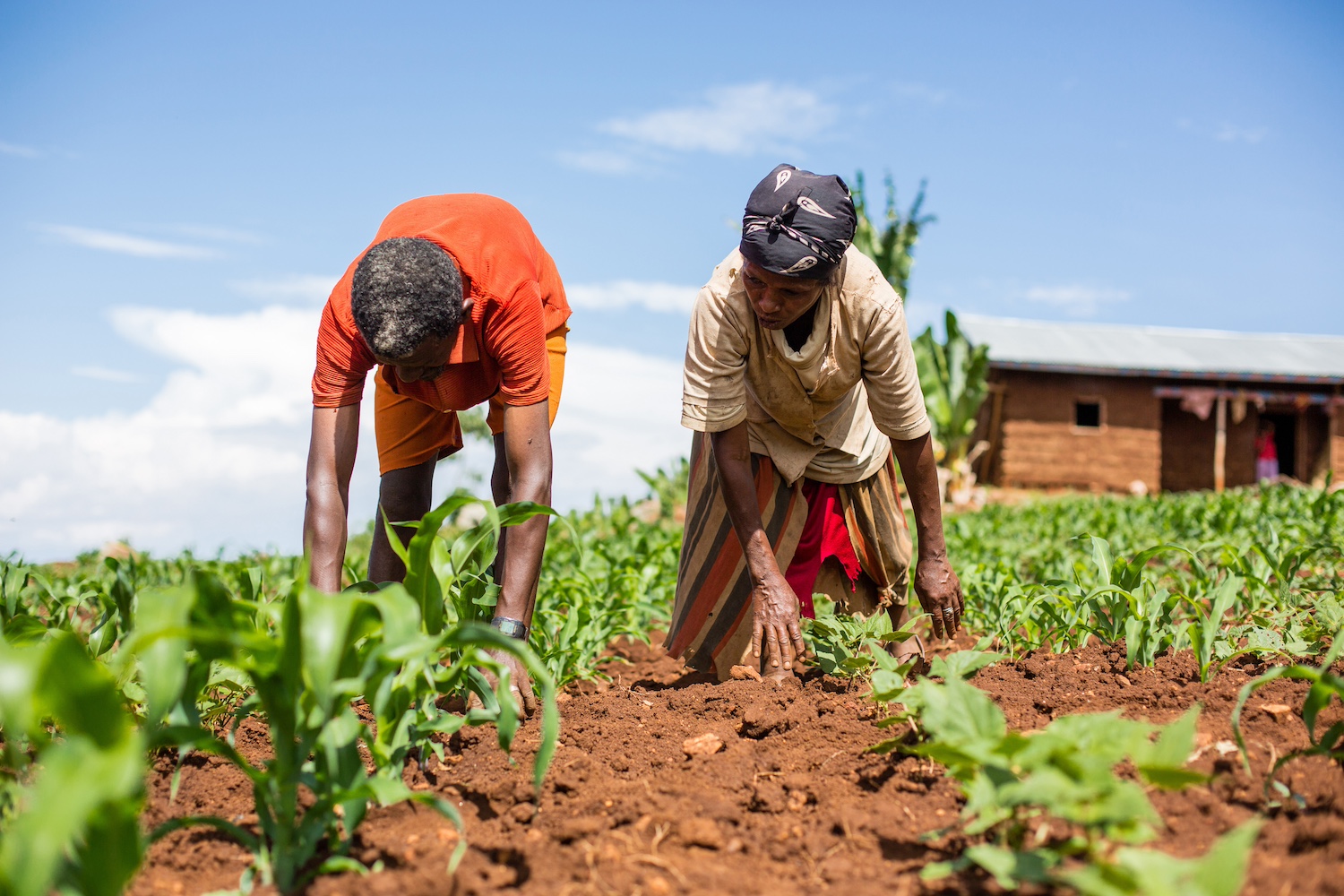Honoring the Critical Role that Smallholder Farmers Play as Environmental Stewards at the Forefront of Climate Change
On this day, the Nuru Collective stands with others around the globe as we reflect on and recommit to land restoration, mitigating desertification, and drought resilience amid the changing climate. World Environment Day, led by the United Nations Environment Programme (UNEP), is the largest international day of recognition for the environment.
COP28
This is the first World Environment Day following the COP28 UN Climate Conference in Dubai. Why was COP28 important? This event was the first global stocktake noting any progress in keeping temperatures below 2°C above pre-industrial levels since the signing of the Paris Agreement ten years ago (UNFCCC). COP28 re-emphasized the need for collective action across sectors and national action plans in pursuit of a more just and sustainable world. For example, in a landmark motion, a loss and damage fund was created to support those most vulnerable to climate change. COP28 participants also recognized the critical need to conserve, protect, and restore nature and ecosystems, which led to the first Declaration on Sustainable Agriculture, Resilient Food Systems, and Climate Action endorsed by 159 countries. These critical policy actions reaffirm the importance of Nuru’s work and place Nuru farmers at the forefront of climate action.
COP28 was attended by “some 85,000 participants, including more than 150 Heads of State and Government, […with] representatives of national delegations, civil society, business, Indigenous Peoples, youth, [and] philanthropy” (COP28). Discussions and evaluations determined that the current progress made has been far too slow, and it is unlikely that we will keep temperatures below 2°C by the year 2100. Simultaneously, 2023 was the warmest year in the 174-year climate record kept by the National Oceanic and Atmospheric Administration (NOAA). COP28 was a contentious multi-stakeholder event yielding some significant policy actions that can reshape climate action. The emphasis on fossil fuels as a transitional energy will require governments, the private sector, and civil society to be more vigilant than ever. The UN Secretary-General noted in his closing speech, that we “must protect those on the frontlines of the climate crisis. We can’t keep kicking the can down the road. We are out of road – and almost out of time.”
Climate Change: The Frontlines
Where are the frontlines of the climate crisis? Farmers in rural communities across Sub-Saharan (SS) Africa are disproportionately facing the greatest threats associated with climate change. The 2023 Intergovernmental Panel on Climate Change’s (IPCC) Sixth Assessment Report (AR6) notes that an estimated 3.3 to 3.6 billion people globally already live in contexts that are highly vulnerable to climate change. These vulnerable contexts include all the national and transboundary landscapes in which Nuru works. AR6 also emphasizes that “some extreme events have already emerged which exceeded projected global warming conditions for 2100” (IPCC).
In the countries where Nuru works–Kenya, Ethiopia, Nigeria, Burkina Faso, and Ghana–extreme conditions are altering weather patterns, resulting in significant negative impacts on livelihoods, food security, nutrition, and national economies. These extreme events and the more subtle shifts in weather and environmental patterns linked to climate change drive increased vulnerability in Nuru-supported communities. However, viewing these communities as victims of climate change is an incomplete picture. It does not offer local leaders their due credit for the ways they already champion both climate change adaptation and mitigation efforts that can support the acceleration and scale of science and evidence-based innovations. More international and donor support for these local innovations represents the core call to action in the COP28 Declaration on Sustainable Agriculture.
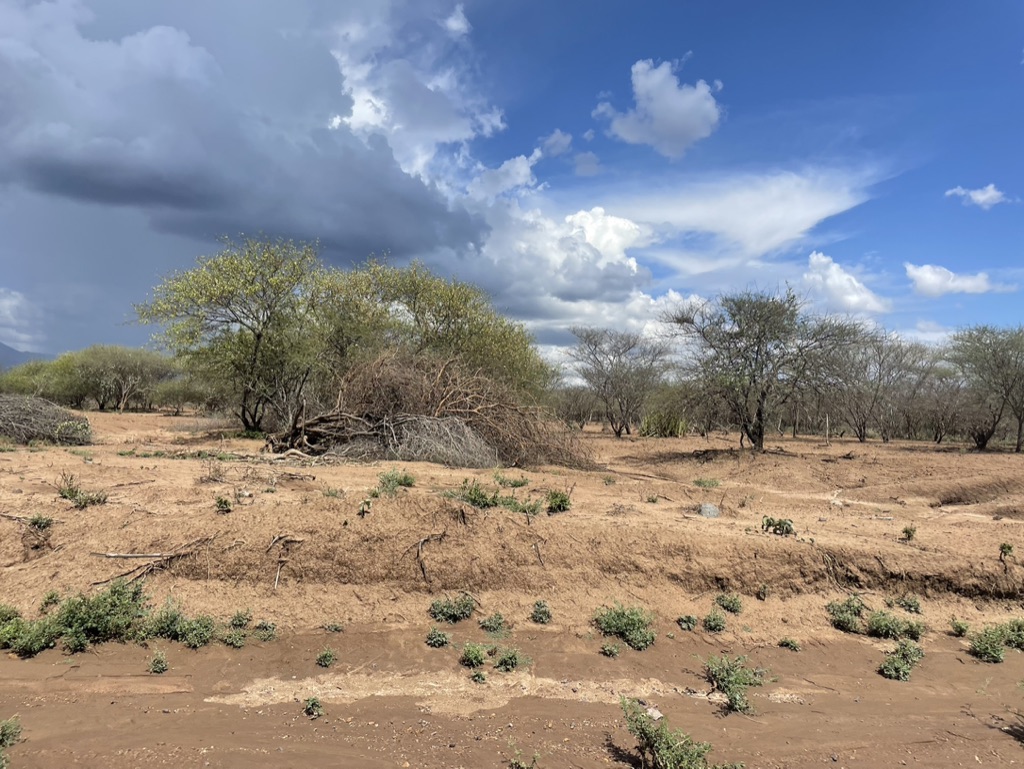
Baringo County, Kenya, 2023
Climate Change Adaptation
Climate change adaptation is the action of adjusting our behaviors, systems, and ways of life to the present and future impacts of climate change. Adaptation is focused on reducing the risks associated with harmful climate-related events and, where applicable, utilizing any potential opportunities, like longer growing seasons. Over the years, the Nuru model has been focused on helping farmers identify local pathways toward greater climate and community resilience by combining global information with local knowledge. Nuru will need to continue scaling and adapting these efforts as our global climate becomes more unpredictable.
Adaptation: Drought Resilience
Droughts and floods are local forces that throw the global food system into chaos, and they are on the rise (International Journal of Disaster Risk Reduction). Drought is an extreme weather event that significantly impacts rural livelihoods and local environments. It is a prolonged dry period in the natural climate cycle over a large area lasting longer than a month (WMO). Droughts can do significant harm to rural populations by causing crop losses, malnutrition and dehydration, and driving migration. However, drought is only one of the many extreme weather events linked to climate change. The severe impact of a drought event is significant, but the most common extreme weather event linked to climate change is flooding (EM-DAT). Floods can also be devastating to food security and public health. Increasing the adaptive capacities of communities to withstand these major weather events is critical to their resilience.
Climate Change Adaptation Efforts at Nuru
To address these challenges, Nuru supports smallholder farmers and their cooperative agribusinesses with climate-smart and nutrition-sensitive agricultural services that help them build their adaptive resilience to droughts and floods like those in East Africa this year. Nuru continues to deliver tailored support to farmer households based on five key pillars of climate adaptation: regenerative agriculture, increased incomes and financial inclusion, food and nutrition security, agribusiness professionalism, and community-based dialogues.
Nuru has spent the last few years researching, debating, and implementing new opportunities to increase the adaptation capacities of farmers and their agribusinesses:
- Nuru has aligned the good agronomic practices promoted to farmers across the collective with climate-smart and regenerative agricultural outcomes based on many years of internal research combined with recent support from Georgetown University graduate students. This will allow Nuru’s local organizations and farmers to prioritize agricultural practices in line with the FAO global roadmap for transforming food systems. These agricultural practices “minimize emissions to the greatest extent possible while still aligning with social and dietary objectives.”
- Nuru Kenya secured the inaugural Nuru Innovation Fund Prize–a Nuru Global Advisory Council Prize that encourages local innovation. This prize was awarded to Nuru Kenya in recognition of its development of a pilot project that integrates traditional SS African Zai Pit practices with hydrogel innovation in semi-arid counties. This innovation will allow plants and tree seedlings to retain water and nutrients, equipping them to withstand variable rainfall and even droughts. Nuru Kenya is piloting this new activity in Baringo County this year.
- Nuru is exploring new and affordable ways for smallholder farmers to benefit from technology. These include drone-based observation powered with AI-informed image analysis for monitoring crop health, smartphone-based soil testing technology for tracking changes in soil health over time, and information and communications technology (ICT) tools that help pastoralists gain the digital insights needed to practice regenerative grazing. These exciting new potential partnerships are built on a foundation of activities that ensure farmers benefit from digitally-enabled climate adaption.
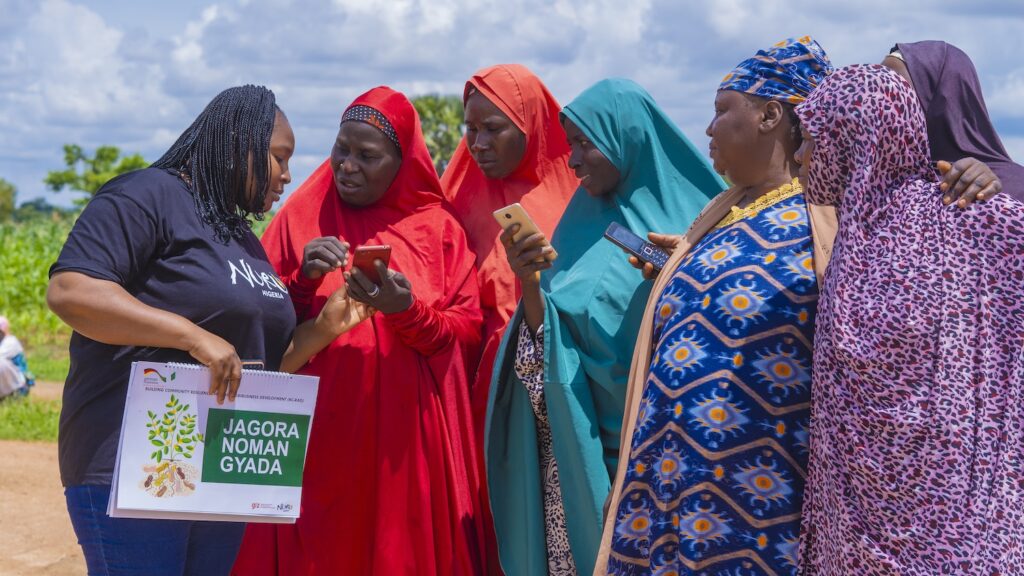
Nuru Nigeria staff member explains the day’s weather forecast to women farmers.
Climate Change Mitigation
Climate change mitigation activities either eliminate the use of fossil fuels or create carbon sinks (anything that extracts carbon from the air and stores it). The communities Nuru serves have always lived within biodiverse landscapes that depend on the responsible actions of farmers and local authorities to conserve and manage natural resources. In turn, activities that support the restoration and sustainable management of natural resources– in particular land and soil–can deliver reductions in greenhouse gas (GHG) emissions.
Mitigation: Land Restoration and Desertification
This year’s World Environment Day takes a look at Land Restoration and Desertification. Desertification is when dry land areas become increasingly arid and salty, making the land degraded. This degradation makes it nearly impossible to conduct agricultural activities or for the land to support endemic biodiversity. It is scientifically well-documented that climate change and unsustainable agriculture and forestry activities are driving more rapid desertification especially in arid and semi-arid landscapes. The goals of land restoration are to increase biodiversity, mitigate the impacts of climate change, and restore ecosystem services on degraded lands experiencing desertification. Rehabilitating land, reforestation through natural regeneration (Conservation International), and soil conservation activities (behaviors used to protect the soil from further degradation) are all forms of land restoration.
Climate Change Mitigation Efforts at Nuru
Nuru has refreshed its community climate resilience strategy in 2023-24 with a greater focus on climate change mitigation. After conducting an internal mapping analysis to clarify the clear overlap between Nuru operating areas and high biodiversity protected areas, Nuru was able to gather further feedback from teams at World Wildlife Fund and Conservation International. The goal of these discussions is to unlock new funding and partnership opportunities that integrate additional activities that support sustainable livelihoods and land restoration. As an example of these areas of overlap, see the map below, which notes Nuru Ethiopia’s areas of operations as well as high biodiversity protected areas.
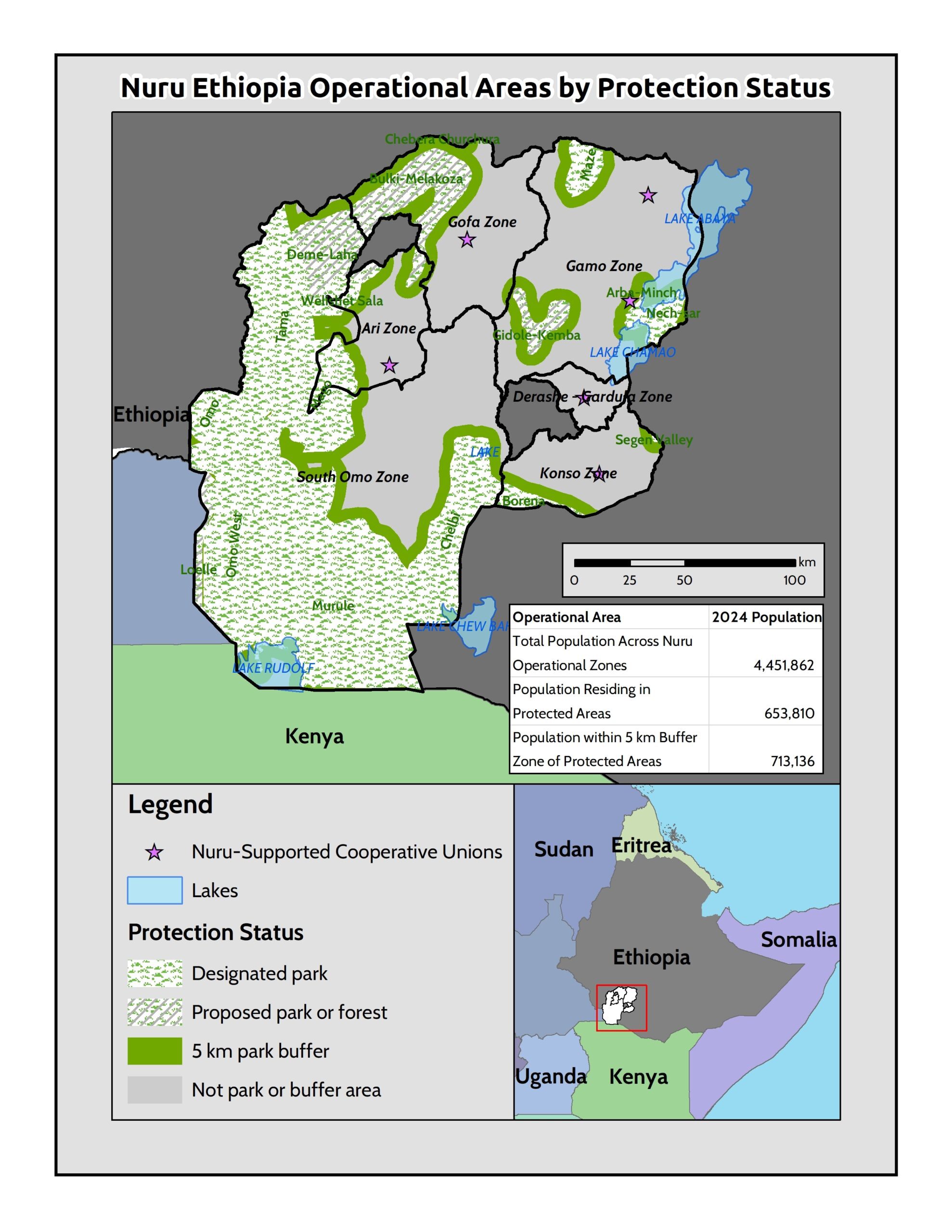
Mapping Credit: Nuru CIO Matt Lineal
Nuru has spent the last few years researching, debating, and implementing new opportunities for increasing the mitigation potential of farmers and their cooperatives:
- Nuru is working with local communities and conservation stakeholders to leverage preexisting nature-based solutions (NbS) at a larger scale that can store carbon dioxide and protect biodiversity in Nigeria, Kenya, Ethiopia, and across the collective.
- Nuru is actively engaging with peer organizations, the private sector, and government partners to identify a feasible pathway for smallholder farmers to measurably and verifiably contribute to carbon sinks. This effort is complicated, as technology to accurately measure carbon sequestration in soils is nascent and the incentives to support smallholder farmers to plant hardwood trees to store more carbon over 15-30 year timelines are only emerging. Moreover, policies that support environmental services are a vital element of this solution being effective. Nuru will monitor these trends to ensure that smallholder farmers can benefit from critical climate finance.
- Lastly, Nuru is developing a practical and internal action plan to offset the carbon footprint of the entire Nuru Collective—a footprint already moderated by 100% remote work at the US-based 501c3 non-profit Nuru. In solidarity with the farmers we support, it is vital that Nuru chart a path to net zero for our local operations in SS Africa.
Local Environmental Stewardship
On this World Environment Day, the Nuru Collective commits to a continued focus on those most vulnerable to the effects of climate change. We continue to hold the tension of the critical role that smallholder farmers play in restoring land, mitigating desertification, and cultivating drought resilience despite their meager contributions to GHG emissions in contrast to countries like the US (Emissions Gap Report 2023). As rural smallholder farmers are tasked with the inevitable responsibilities that have been burdensomely placed on those living on the frontlines of climate injustice, we see World Environment Day as a call to action for our global community to support these efforts.
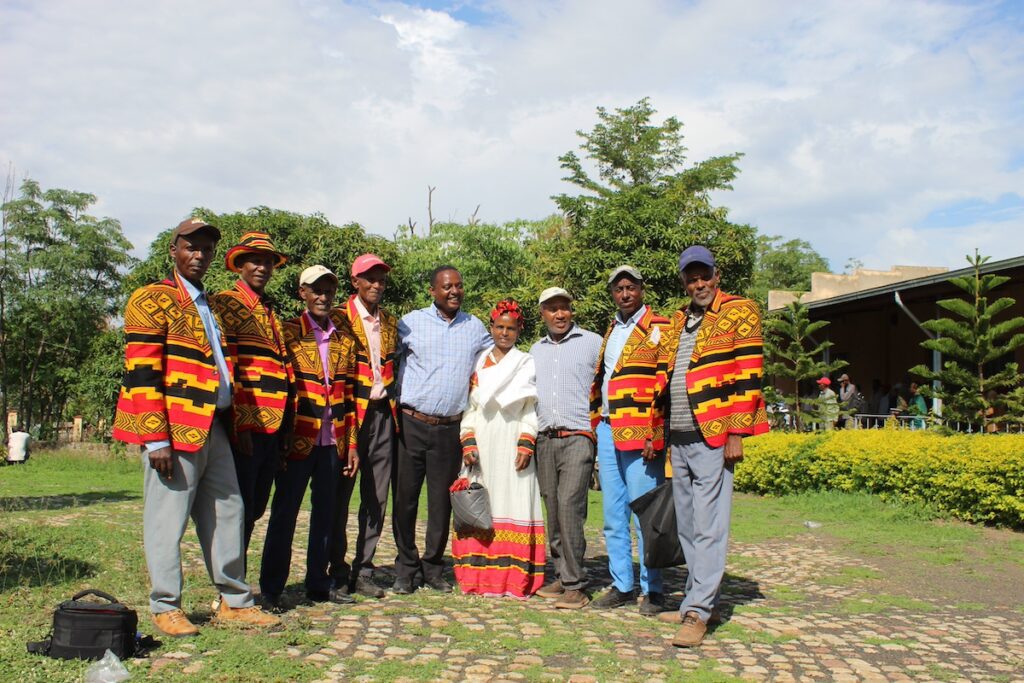
Nuru Ethiopia Cooperative & Agribusiness Program Manager Biruk Abayneh pictured with farmer cooperative leaders, 2022
The UN Secretary-General’s closing remarks at COP28 noted, “We need all commitments made by developed countries on finance and adaptation to be met — fully and transparently. We need increased capital and reform of the business model of multilateral development banks to massively increase direct support – and to leverage far more private finance at reasonable costs for developing countries’ climate action efforts” (COP28). If we take to heart this call to action placed on our global community at COP28, we will invest in the local leaders driving positive change in vulnerable communities–those who are both most impacted by and most equipped to lead this effort.
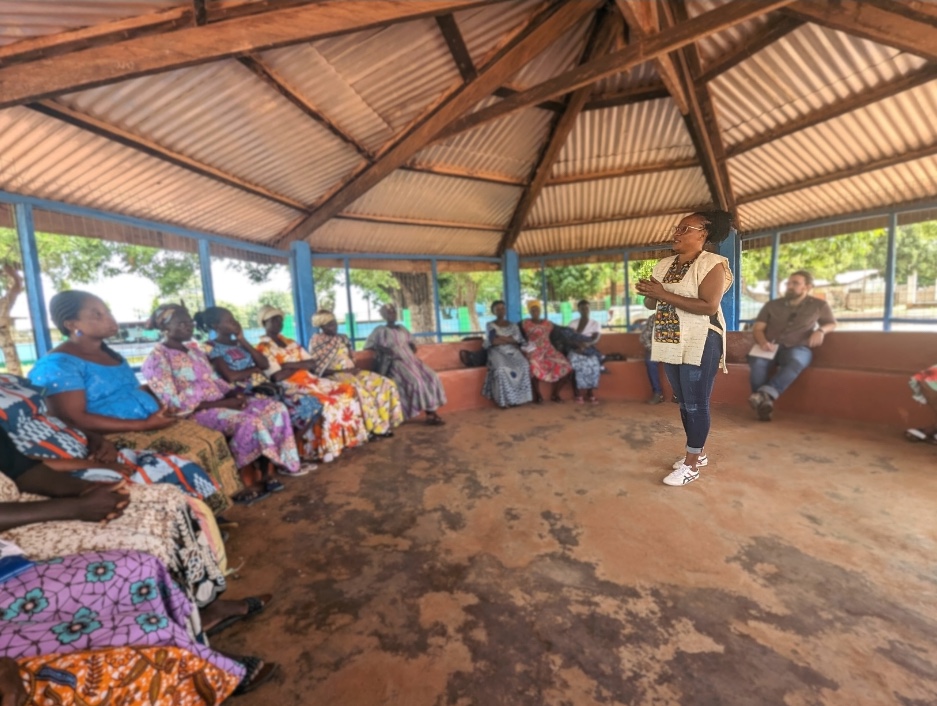
Nuru Ghana, 2023
Climate change adaptation and mitigation demand a global response across sectors. At Nuru, we have been privileged to work with forward-thinking partners (individuals, foundations, corporations, bilateral, multilateral organizations, etc.) who have provided technical tools and expertise, financial support, and thoughtful discourse to champion vulnerable communities impacted by climate change. We are eager to build more of these partnerships, aligning the strengths of each of our partners with the needs of the communities where we work. For more information about partnership opportunities, please contact us at info@iamnuru.org or visit our partnerships page.
Make a difference.
Give today to support local leaders and address climate change.
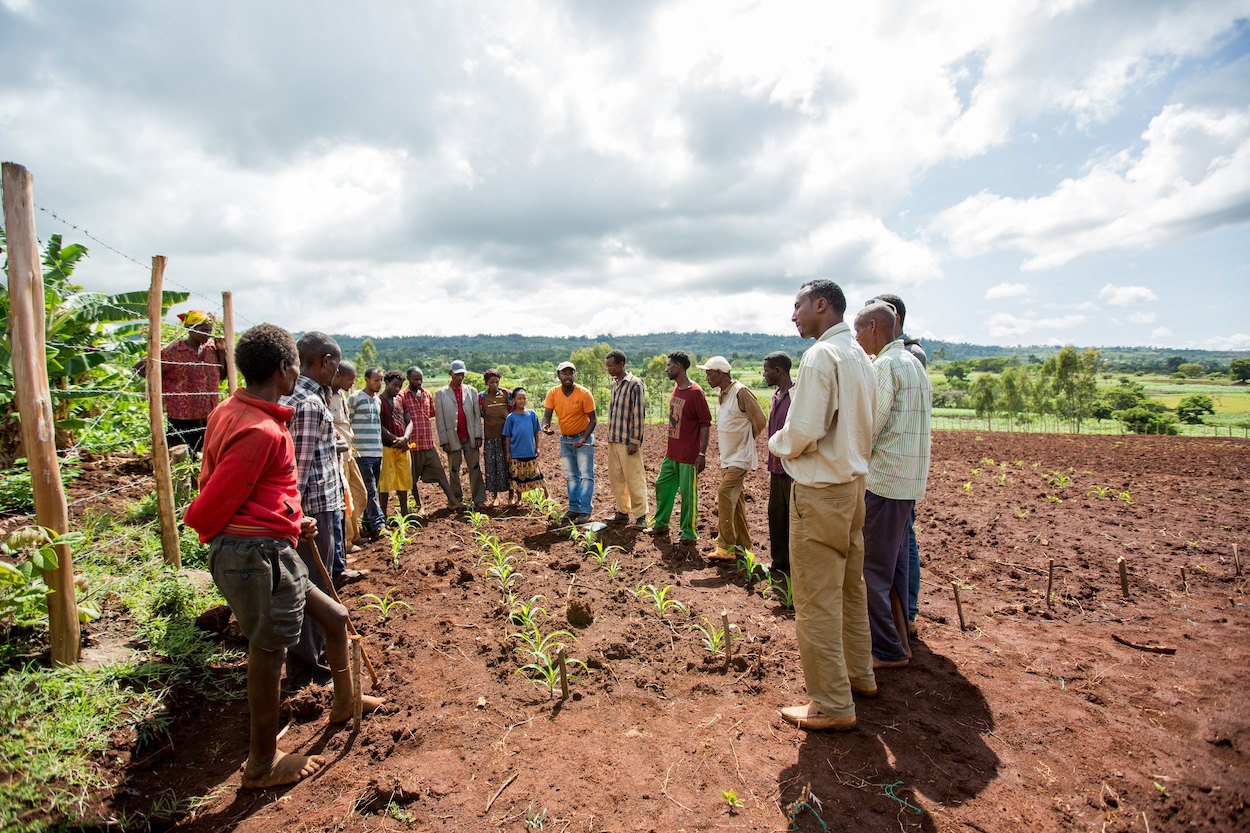
Nuru Ethiopia, Agriculture Training, 2014


